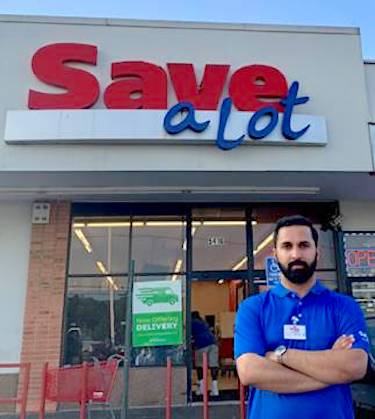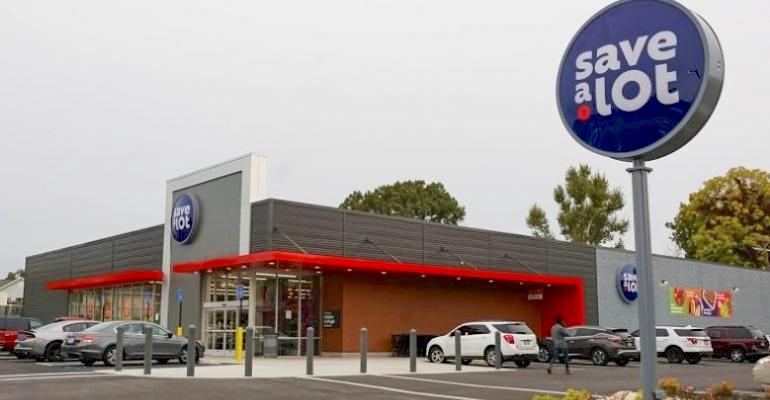As part of a shift to a wholesale business model, discount grocer Save A Lot has sold five Washington, D.C.-area stores to an independent retailer.
St. Louis-based Save A Lot said Friday that the corporate-owned stores, all in Maryland, are being purchased by AQS Foods LLC, an operator of gas stations and convenience stores. The locations sold, now operating under AQS and owner Qasim Warraich of Port Deposit, Md., are in Temple Hills (2346 Iverson St.), Forestville (7782 Marlboro Pike), Bladensburg (5416 Annapolis Rd.), Oxon Hill (6309 Livingston Rd.) and Seat Pleasant (5933 Martin Luther King Hwy.), Md.
“We’re pleased to have Qasim join our Save A Lot team, bringing a passion for our customers and a strong commitment to growing the brand,” Save A Lot CEO Kenneth McGrath said in a statement. “Qasim is well-positioned to respond to the needs of the local community. We’re looking forward to working together and continuing to serve customers across the region.”
Plans call for AQS to remodel all five stores, both interiors and exteriors, within the next year, as well as customize each store’s assortment to the needs and preferences of their communities, according to Save A Lot.
 AQS Foods owner Qasim Warraich said he plans to full remodel the acquired Save A Lots and personally oversee their management. (Photo courtesy of Save A Lot)
AQS Foods owner Qasim Warraich said he plans to full remodel the acquired Save A Lots and personally oversee their management. (Photo courtesy of Save A Lot)
For Warraich, the acquisition of the Save A Lot stores marks his entry into the grocery retail business. He has more than nine years of experience in operating gas stations and convenience stores in Oklahoma and Maryland. Save A Lot noted that Warraich will personally oversee management of the purchased stores, splitting his time each week across the five locations.
“I’ve been interested in expanding into the grocery segment for some time and am very fortunate to be partnering with a strong national brand like Save A Lot,” Warraich commented. “The D.C.-area locations are in strong neighborhoods with great potential for steady growth, and completely overhauling all stores in the near future will only contribute to that while providing a superior shopping experience for customers. As we begin to make the kind of changes shoppers can see and feel in-store, I’m confident we’ll continue to build a loyal following. I’m looking forward to taking on the new challenges that come with operating a neighborhood grocery store and especially in serving local residents.”
Save A Lot announced in late December that it’s transitioning from a grocery retail to a grocer wholesale model. Under the plan, the company aims to sell more than 300 corporate-operated locations to current and new retail partners.
Upon announcing the strategy, Save A Lot said it had enacted seven sale transactions encompassing 82 company-operated stores, with other deals nearing completion. Those transactions included 51 stores in the Tampa, Fla., market sold to Fresh Encounter Inc., a Findlay, Ohio-based independent grocer that will continue to run the locations under the Save A Lot banner. Also, in October, four Save A Lot supermarkets in Nashville, Tenn., were acquired by J. Word Enterprises LLC, an affiliate of real estate investment firm J. Word Properties. With the transaction, J. Word Enterprises became Save A Lot’s retail partner in Nashville.
Save A Lot has said it expects to finish the transition of most corporate stores to independent ownership in 2021. The company plans to retain 21 corporate-operated stores in St. Louis to serve as test locations for innovations to help retail partners nationwide. Overall, Save A Lot operates 13 distribution centers and has a retail network of more than 1,000 stores in 32 states, with the vast majority of the locations licensed by over 200 independent grocers.
Save A Lot’s discount grocery model focuses on localized assortments and local ownership. Company executives say that approach enables independent grocers under the banner to cater their customers and communities while maintaining the benefits of a value grocery model: a heavy focus on private label — which accounts for the majority of Save A Lot products — plus a limited assortment, low-cost operational model and easy-to-shop store layout.
On average, Save A Lot stores run about 16,000 square feet and carry roughly 2,000 SKUs across more than 50 private brands. Through an everyday low pricing (EDLP) strategy, the retailer offers savings of up to 40% over conventional supermarkets on private- and national-brand products, USDA-inspected meat, farm-fresh produce and non-food items.


